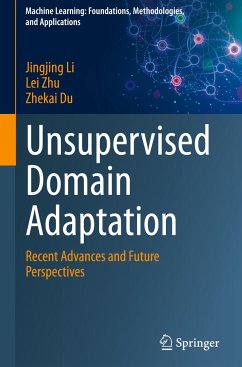
Cross-device Federated Recommendation
Privacy-Preserving Personalization

PAYBACK Punkte
46 °P sammeln!
This book introduces the prevailing domains of recommender systems and cross-device federated learning, highlighting the latest research progress and prospects regarding cross-device federated recommendation. As a privacy-oriented distributed computing paradigm, cross-device federated learning enables collaborative intelligence across multiple devices while ensuring the security of local data. In this context, ubiquitous recommendation services emerge as a crucial application of device-side AI, making a deep exploration of federated recommendation systems highly significant.This book is self-c...
This book introduces the prevailing domains of recommender systems and cross-device federated learning, highlighting the latest research progress and prospects regarding cross-device federated recommendation. As a privacy-oriented distributed computing paradigm, cross-device federated learning enables collaborative intelligence across multiple devices while ensuring the security of local data. In this context, ubiquitous recommendation services emerge as a crucial application of device-side AI, making a deep exploration of federated recommendation systems highly significant.
This book is self-contained, and each chapter can be comprehended independently. Overall, the book organizes existing efforts in federated recommendation from three different perspectives. The perspective of learning paradigms includes statistical machine learning, deep learning, reinforcement learning, and meta learning, where each has detailed techniques (e.g., different neural building blocks) to present relevant studies. The perspective of privacy computing covers homomorphic encryption, differential privacy, secure multi-party computing, and malicious attacks. More specific encryption and obfuscation techniques, such as randomized response and secret sharing, are involved. The perspective of federated issues discusses communication optimization and fairness perception, which are widely concerned in the cross-device distributed environment. In the end, potential issues and promising directions for future research are identified point by point.
This book is especially suitable for researchers working on the application of recommendation algorithms to the privacy-preserving federated scenario. The target audience includes graduate students, academic researchers, and industrial practitioners who specialize in recommender systems, distributed machine learning, information retrieval, information security, or artificial intelligence.
This book is self-contained, and each chapter can be comprehended independently. Overall, the book organizes existing efforts in federated recommendation from three different perspectives. The perspective of learning paradigms includes statistical machine learning, deep learning, reinforcement learning, and meta learning, where each has detailed techniques (e.g., different neural building blocks) to present relevant studies. The perspective of privacy computing covers homomorphic encryption, differential privacy, secure multi-party computing, and malicious attacks. More specific encryption and obfuscation techniques, such as randomized response and secret sharing, are involved. The perspective of federated issues discusses communication optimization and fairness perception, which are widely concerned in the cross-device distributed environment. In the end, potential issues and promising directions for future research are identified point by point.
This book is especially suitable for researchers working on the application of recommendation algorithms to the privacy-preserving federated scenario. The target audience includes graduate students, academic researchers, and industrial practitioners who specialize in recommender systems, distributed machine learning, information retrieval, information security, or artificial intelligence.












